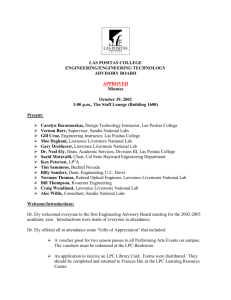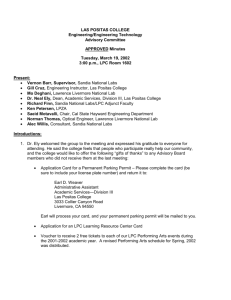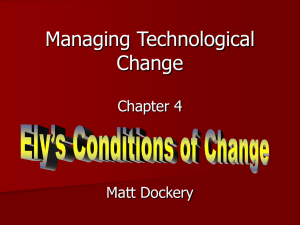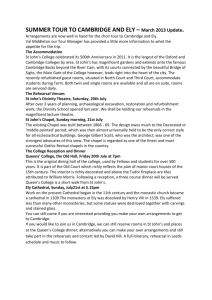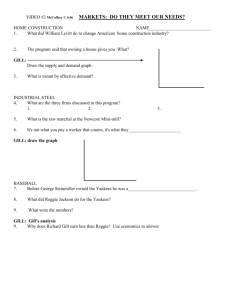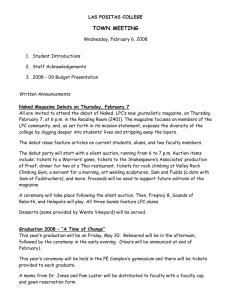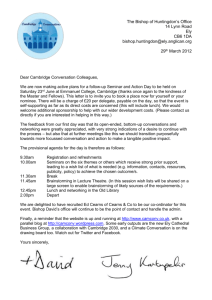April 1, 2003 - Las Positas College
advertisement
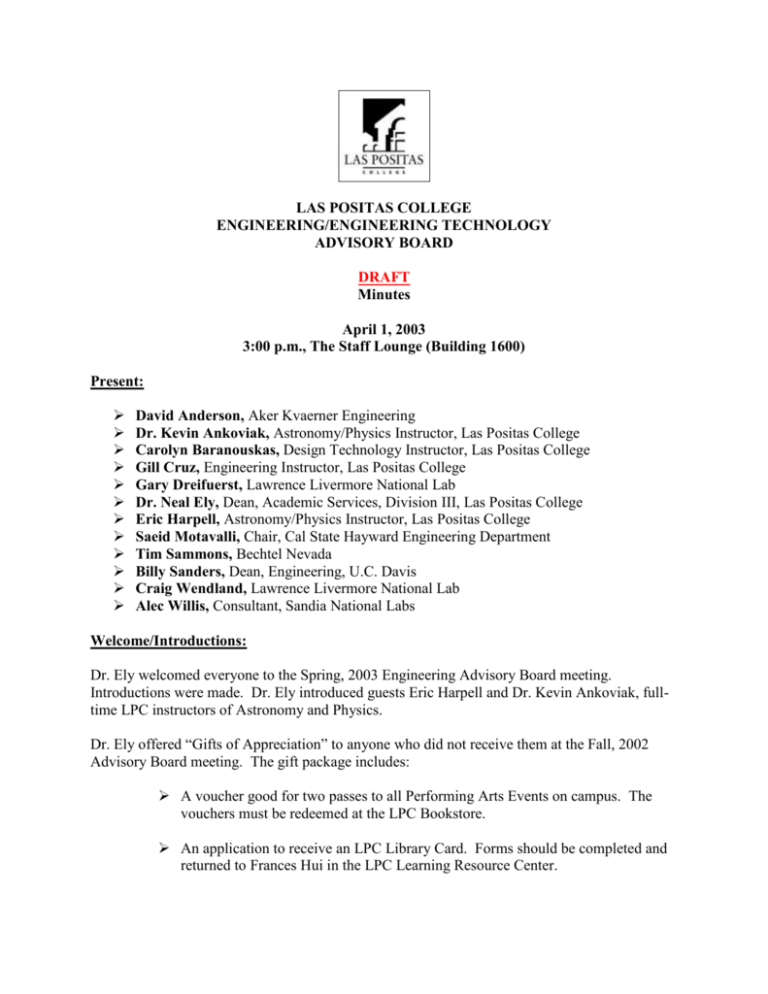
LAS POSITAS COLLEGE ENGINEERING/ENGINEERING TECHNOLOGY ADVISORY BOARD DRAFT Minutes April 1, 2003 3:00 p.m., The Staff Lounge (Building 1600) Present: David Anderson, Aker Kvaerner Engineering Dr. Kevin Ankoviak, Astronomy/Physics Instructor, Las Positas College Carolyn Baranouskas, Design Technology Instructor, Las Positas College Gill Cruz, Engineering Instructor, Las Positas College Gary Dreifuerst, Lawrence Livermore National Lab Dr. Neal Ely, Dean, Academic Services, Division III, Las Positas College Eric Harpell, Astronomy/Physics Instructor, Las Positas College Saeid Motavalli, Chair, Cal State Hayward Engineering Department Tim Sammons, Bechtel Nevada Billy Sanders, Dean, Engineering, U.C. Davis Craig Wendland, Lawrence Livermore National Lab Alec Willis, Consultant, Sandia National Labs Welcome/Introductions: Dr. Ely welcomed everyone to the Spring, 2003 Engineering Advisory Board meeting. Introductions were made. Dr. Ely introduced guests Eric Harpell and Dr. Kevin Ankoviak, fulltime LPC instructors of Astronomy and Physics. Dr. Ely offered “Gifts of Appreciation” to anyone who did not receive them at the Fall, 2002 Advisory Board meeting. The gift package includes: A voucher good for two passes to all Performing Arts Events on campus. The vouchers must be redeemed at the LPC Bookstore. An application to receive an LPC Library Card. Forms should be completed and returned to Frances Hui in the LPC Learning Resource Center. Engineering Advisory Board Meeting Minutes April 1, 2003 – Page 2 The college is offering a new parking pass to Advisory Board members that are good through 2005. Vehicle registration information is required, and Board members should see Earl Weaver, Administrative Assistant to Dr. Ely, after the meeting in order to get their parking passes. Approval of Fall, 2002 Minutes: Alec Willis moved to accept the minutes from the October 29, 2002 meeting. Billy Sanders seconded. The motion was passed unanimously. College Update of Programs: Spring, 2003: Dr. Ely reported enrollments are looking good, and they are about where they should be, except for Descriptive Geometry. Gill Cruz is working with the LPC Counseling staff. Students aren’t being encouraged to take ENGR 10 and ENGR 20 concurrently, and failing to do this throws them out of sequence. Gill reported that many students also get out of course sequence because they are deficient in their math skills. He said that students who took ENGR 10 (Intro to Engineering) and ENGR 20 (Engineering Graphics) in the Fall semester probably won’t be seen again in his other classes until next year, because they will need to spend some time catching up in their math and science classes. David Anderson asked what is the focus of ENGR 20? Gill said he teaches the class from a conceptual design perspective. David asked if three-dimensional design is covered in the class, because Aker Kvaerner is rapidly moving away from AutoCAD and other drawing programs. Enrollments for Spring, 2003 are: Course ENGR 20 ENGR 21 ENGR 44 ENGR 45 Title Engineering Graphics Descriptive Geometry Intro to Circuit Analysis Materials of Engineering Allowed 30 30 30 30 Enrolled 19 10 14 12 Instructor Duran Cruz Cruz Cruz Engineering Advisory Board Meeting Minutes April 1, 2003 – Page 3 Fall, 2003: Dr. Ely reported the same sequence of classes offered during Fall, 2002 will be offered this coming Fall term, which was not easy to maintain given the nature of the State budget crisis. The following courses will be offered during the Fall, 2003 semester: ENGR 10 ENGR 15 ENGR 20 ENGR 35 Introduction to Engineering (2 sections) Intro to Optical Science/Engineering Engineering Graphics Statics 2 units 4 units 2 units 3 units Reports to the Board Gill reported he is still seeing a lot of students coming into the program without a strong background in math and sciences. He has been working with counselors at local high schools to encourage students to take the appropriate preliminary coursework if they are considering coming to LPC to major in Engineering. Gill said he has been getting a good response from California High School and is making more in-roads with counselors at other Tri-Valley high schools. The biggest problem Gill is facing is that faculty are resistant when it comes to giving up class time to allow him to present his program overview. He is getting a lot of support from school administrators, however. There are counselors at all the high schools now who work with Gill, though there is concern that with impending budget cuts, some positions will be lost. Alec Willis expressed concern that with the cuts at the high school level, LPC will become a remedial training program. Gill and Eric Harpell said they are not seeing that happening with the students in their classes. Gill reported he tries to do a lot of recruiting in April in order to attract students who may not have been accepted by their “first choice” 4-year college. So far, his efforts have paid off, as he has been able to attract students to our program, especially when they realize the success rate of transfer students who have completed our program first. Billy Sanders said he is seeing a dramatic increase in applications at UC Davis. In the last four years, freshmen applications have grown from 2,800 to over 6,000. He said that all the UC campuses are getting flooded with freshman applications. However, the number of applications from transfer students has stayed consistent. Billy explained that he has approximately 200 slots allotted for transfer students. Every year he has transfer slots unfilled, so it would be beneficial to many students to do their work first at LPC and then transfer to UC Davis. They have a better chance of gaining entrance to that program. Engineering Advisory Board Meeting Minutes April 1, 2003 – Page 4 Dr. Ely said when enrollments at the UC and CSU colleges start to get impacted, we start to see growth in our program. This is another reason why Gill recruits in Spring. It has been a selling point with students to come to our program first for two years, because it affords them a better chance of gaining admission into a university program. Gill said he is experiencing good transfer success. This year, almost 50% of his students are transferring to UC Davis; San Jose State University, and Cal Poly/San Luis Obispo see the other 50%. Class visits from representatives at transfer schools have helped Gill’s students understand more clearly what they need to complete before moving into upper division coursework. Gill reported he is pretty much on track for the rest of the year with classroom supplies, expendables, and consumables. He has had great success sharing resources with the Physics Department. Budget and Enrollment Management: Dr. Ely reported that community colleges are getting hit hard with cuts in the State budget. Mid-year cuts were approximately 3.3% systemwide. The UC and CSU systems have only been hit with a 1.5% cut, but those systems are able to increase their fees to cover the loss. The State’s community colleges are unable to raise fees at will, and even if the fees get raised, we are unable to keep the funds. They are returned to the State’s general fund. We have managed our mid-year cuts and projected 2003-2004 cuts partly through onetime cuts. It is estimated the cut for 2003-2004 will be 7%-10%, and we will see the worse impacts in 2004-2005 when there is no more “one-time” money to use. One of the largest problems we have is that the majority of our costs are for personnel and salaries. The good news is we have been able to maintain the Engineering program as well as sections of calculus, physics, and chemistry that required for the major. Dr. Ely explained the college has started an enrollment management process to help manage our growth. Approximately 70 sections of classes were cut for Spring, 2003, and approximately 50% of the summer schedule has been reduced. We will see approximately a 10% reduction in class sections for Fall, 2003, and cuts for Spring, 2004 are still being planned. Engineering Advisory Board Meeting Minutes April 1, 2003 – Page 5 Alec Willis asked if LPC has control over the amount they charge for fees. Dr. Ely said we don’t, but there is discussion in the Legislature to increase fees from $11 a unit to as much as $24 a unit. Dr. Ely explained that a major problem we are seeing with cuts to categorical programs is that it’s hurting the students who need our help the most. Gary Dreifuerst asked if the $11 a unit is applied to schools across the State? Dr. Ely said, “Yes” and explained there are proposals that ramp up the fees gradually, and some plans also call for campuses being able to keep some of the fee money to help with costs. Alec asked if it was possible to charge extra fees for classes with costly labs? Dr. Ely said that is not allowed in the State’s education code. Dr. Ely said the Tri-Valley area is showing a 30% increase in the number of college-age students, and this is already presenting some problems as we continue to cut course sections. He reported that LPC has been growing at a rate of 7%-8% every semester, but the State only funds us for 3%, so it has been extremely difficult to get a handle on how to accommodate the extra students. Concurrent Enrollment: Dr. Ely reported the State has withdrawn $80 million from the budget after some schools were caught abusing their concurrent enrollment programs. LPC has re-examined its policy on concurrent enrollment and has instituted a new policy for Fall, 2003: 1. 2. 3. 4. 5. Only high school juniors and seniors will be allowed to register. There will be no enrollment allowed in remedial classes. Students can take a maximum of 6 units or two classes. Enrollment won’t be allowed until the week before school begins. Each student will be required to have a Principal’s signature of authorization. There will be no concurrent enrollment allowed for Summer, 2003. Eric asked if a student graduating in June will be able to enroll in summer courses. Dr. Ely explained the concurrent enrollment rules will not apply to any high school student graduating this June. Division Web Site: Dr. Ely announced the creation of a new Division web site. He explained the site is up and running and includes links to every discipline in Division III, including Engineering. Dr. Ely thanked Earl Weaver, Administrative Assistant to Division III, for all his work creating the site. A handout was given to everyone in attendance, and Dr. Ely encouraged Board members to visit the site and offer feedback. Engineering Advisory Board Meeting Minutes April 1, 2003 – Page 6 Physics Requirement: Dr. Ely explained to the Board that some issues have been raised about our new foursemester Physics sequence within the Engineering major. A fourth course was created in Modern Physics. LPC President Karen Halliday and members of the LPC Counseling staff have expressed concern that requiring a fourth semester of physics will keep students from completing their program in two years. Billy said UC Davis offers a 4-quarter sequence that equals 16 quarter units, or 12 semester units. He said almost all of the community colleges in the state offer a threecourse semester sequence at 4 units per course, but not all colleges are offering Modern Physics. Billy said they only require completion of 8 semester (or 12 quarter) units in order to enter the UC Davis program. Billy explained that Modern Physics is a requirement only for the Electrical, Computer, and Electrical/Materials Engineering programs. Otherwise, students need only complete Mechanics and Electricity and Magnetism components before transferring. Saied Moltavalli said CSU Hayward offers three courses at 5 quarter units each. They do not offer Modern Physics in their lower division, and it is not required for the major. Eric said that he and Dr. Ankoviak like teaching the Modern Physics class. They revamped the curriculum to four semesters, because they were finding it difficult to cover all the material students need in three semesters. Dr. Ankoviak is teaching the class this semester in a lecture/lab format. He said his students have told him they are enjoying the class and are very appreciative it is being offered. Eric asked for feedback from the Advisory Board as to whether or not they see this fourcourse sequence as a problem. He suggested maybe we don’t require the fourth semester, but rather offer it as a “stand alone” course. Eric said he and Dr. Ankoviak have surveyed their students, and the majority do not have an issue with taking the fourth semester. Billy said he thought offering Modern Physics as a “stand alone” class was a good idea. Then students are not forced to take an extra semester of coursework. He suggested requiring the first three semesters and offering the fourth course as an elective for those students who want it. Billy said he would provide copies of their articulation agreements with schools throughout the state so Eric and Dr. Ankoviak could see what other schools are offering and requiring. Billy said American River is now offering a Modern Physics course, but most schools don’t offer it. He feels it is very progressive for a school to include the class in their offerings. Engineering Advisory Board Meeting Minutes April 1, 2003 – Page 7 Internships: The Tri-Valley Connections Internships Program (TVCIP) helps students prepare for and find internship positions. TVCIP serves junior and senior high school students in the Dublin, Livermore Valley, and Pleasanton school districts, LPC students, and Tri-Valley businesses. Students go through two phases of the program: Internship-Readiness Course at LPC. This course is offered via concurrent enrollment, per the policies of each high school. This one-unit course totals approximately 12 hours of classroom instruction and helps students develop the skills necessary to succeed in the work-world. Topics such as career assessment, resume writing, interviewing skills, and professionalism will be addressed. The Internship Experience – After completing the Internship-Readiness course, students are eligible to apply for internships. Employers select applicants and hold interview for internship positions. After the interviews, employers make internship offers to selected students. In addition to their obligations at the work-site, students hired as interns enroll in an Internship Seminar/Field Placement course at LPC. The instructor of this course supervises the internship. Each month, students meet with their Internship Seminar class to discuss and analyze their experiences. Recommendations by the Advisory Board: Billy recommended that LPC insure their Engineering students prepare well ahead of their anticipated transfer date. He is seeing a lot of students being turned down for admission because they are lacking the required prerequisite courses, though not specifically LPC students. Billy commended Gill for doing a fine job of preparing students for transfer into the UC Davis program. Gill said he has two textbooks he would like to use in his classes, but each book costs more than $100 each. He doesn’t want to burden his students financially by requiring them to purchase both books. He would like to get seven copies of “Materials Science and Engineering, an Introduction” by William D. Callister, Jr., published by Wiley, ISBN#: 0-471-50488-2 (Latest edition) to have at the reference desk in the school’s Learning Resource Center. It would be extremely beneficial to the program if a company or individual were interested in purchasing those textbooks as a donation to the program. Other: 1. Norm Thomas sent Gill an announcement to share with the Board. The optical fabrication program at Yuba College has disbanded, and all the equipment has been transferred to UC Davis. Dr. Ely said that LPC was offered the equipment, but it required 3,000 square feet of space, which we just don’t have. Engineering Advisory Board Meeting Minutes April 1, 2003 – Page 8 2. Dr. Ely presented a new “LPC Reorganization Chart” and explained the creation of a new Division at LPC, which now handles Computer Information Systems, Computer Science, Computer Networking, and Electronics. Date of the next meeting: Tuesday, October 21 at 3 p.m. The meeting adjourned at 4:30 p.m. Minutes submitted by Earl D. Weaver, Administrative Assistant to Dr. Neal Ely POSTED TO THE DIVISION III WEBSITE ON ???
